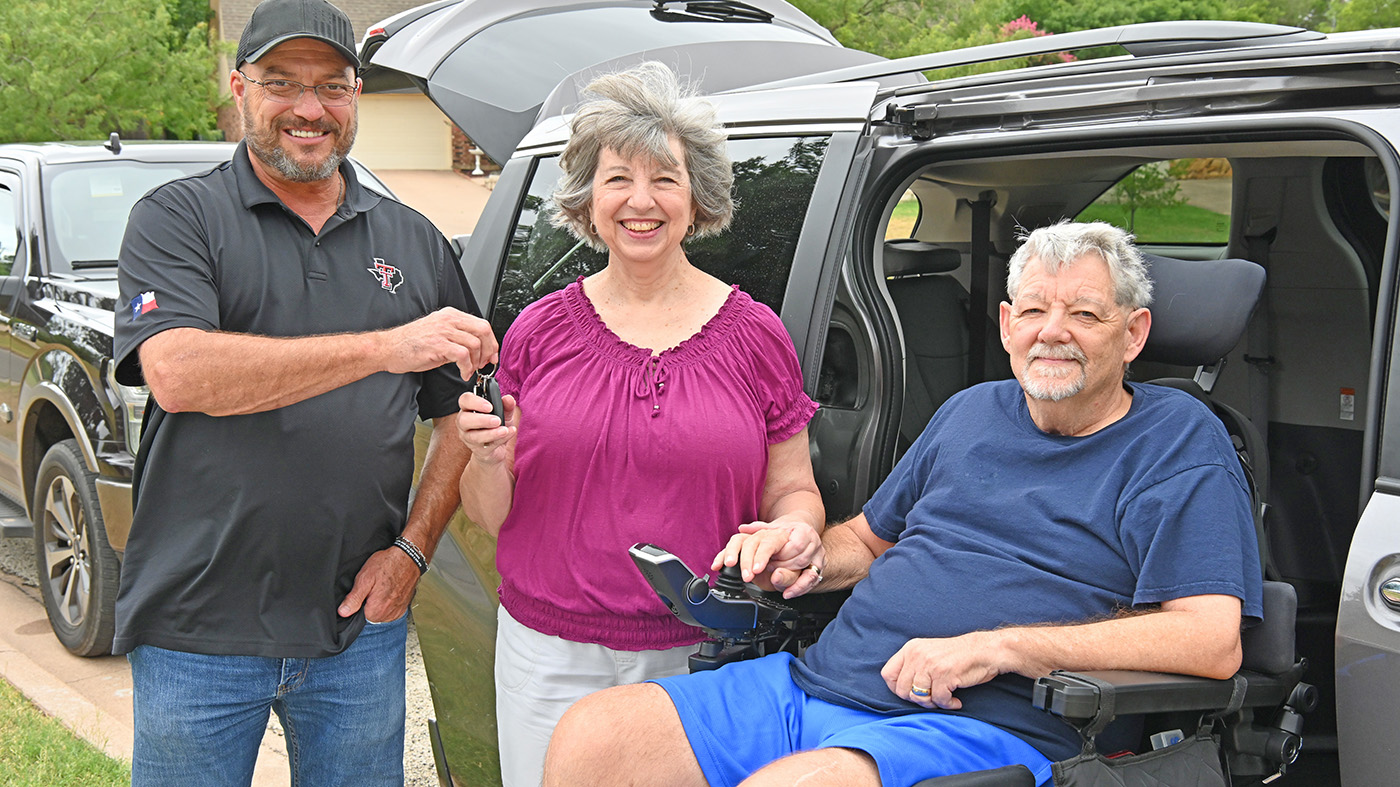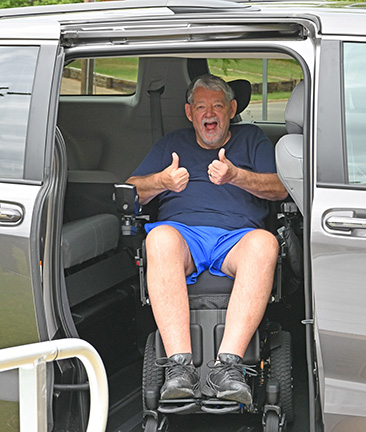Air Force Veteran John Hanson is no stranger to new adventures. After 20 years in the service, he found himself battling chronic lower back pain. Numerous referrals and appointments later, he was diagnosed with Lou Gehrig’s Disease. Hanson and his family set out to navigate this unexpected life chapter alongside VA.
“I kept falling and felt like I was losing my memory. I couldn’t go where I wanted. I couldn’t see friends anymore. I couldn’t even go to church. I was slowly starting to lose my independence,” Hanson shared.
VA took the initiative to ensure every resource available was there to support Hanson, including providing his family with a specially modified vehicle that enables Hanson to enjoy the freedom of mobility.
“VA moved quickly,” said wife Cindy Hanson. “We didn’t have to wait more than two weeks for all the medical devices. Everyone was so responsive, fast and courteous. I didn’t think we were going to have this experience.”
“This is a journey they don’t have to navigate on their own.”
Christopher Rodriguez, George H. O’Brien Jr. VA prosthetic representative, was an integral staff member in connecting John with VA automobile allowance and adaptive equipment benefits to help manage his condition.
“We are more than happy to help. We have so many resources to help manage the impacts of this condition. We want all our Veterans and their family members to know this is a journey they don’t have to navigate on their own,” Rodriguez said.
To provide ease in his home, VA helped supply bathroom and shower modifications, physical therapy lifters, a power wheelchair and sleeping devices to cater to Hanson’s specific physical needs.
“VA has been so proactive. We feel fully supported and cared for,” said Cindy. “VA is on a mission to take care of Veterans. Our experience has shown us that’s exactly what they are doing.”
To continue his rehabilitation with Rodriquez’s support, the Hansons applied for a specially equipped vehicle that features lifts, ramps and seats designed specifically to work with Hanson’s devices.
“Part of my treatment is my social support. I can finally get out of the house. I get to see my children and attend services once again. It’s like I’m living life again,” John said.
Pictured above, Open Road Mobility representative Sheldon Stagg, Cindy and John receive the keys to a brand new and specially equipped ALS vehicle.
“VA has opened doors for me.”
In 2008, VA announced that Lou Gehrig’s Disease, also known as ALS, would be listed as a presumptive compensable illness for all Veterans with 90 or more days of continuous active service.
John said VA has been an ally that has stood by his side. “I can’t say enough about how we have been treated. VA has opened doors for me. I don’t think we can ask for more. This is called freedom.”
Topics in this story
More Stories
Veteran Byron Potier weighed almost 300 pounds and was tired and lethargic. He was the perfect candidate for gastric sleeve surgery.
How much do you know about VA care, benefits and services? Don’t miss out on what you've earned—check out the "2025 VA Federal Benefits Guide for Veterans, Dependents, Survivors, and Caregivers" handbook to learn more.
Feeling stressed? Your breath can help you relax and focus. Take 3 minutes to reset and prioritize your well being for this week's #LiveWholeHealth practice.








Please help my husband age at-home by building a stair lift in our three floor trinity house.
I find it striking you feature ONE extraordinary story, whereas most veterans at VA health centers receive decidedly SUBOPTIMAL care. My 100% disabled veteran was stuck with an oncologist at the VA who, after suffering a bad bout o Covid-19, came back to work unable to keep up with patient care. His neglect of his patients was so obvious a retired nurse came back to work and sat in his office while he saw his patients to help him interact with them.
The other oncologist my husband was able to see at his VA health center READ and RESPONDED to email during his first and only meeting with my husband.
I was finally so irate that my letters to the patient advocate’s office at his VA got his care transferred to a hospital in our city that is a nationally recognized cancer care center. Why did he have to receive such sub-par care for two years before he was finally transferred to an EXCELLENT first rate doctor?
The military motto is “we take care of our own.” I sure am glad I am not one of their own!!!
Now I have to lobby again with the patient’s advocate office to get him a PCP at the same cancer care hospital where he sees his oncologist. His PCP at the VA gets notes about his oncology care but HAS NOT bothered to see my husband in over two years since his diagnosis over three years ago!!
I wonder whether this is the same quality of care all veterans in the US who become disabled I the service receive from their grateful government!!!!